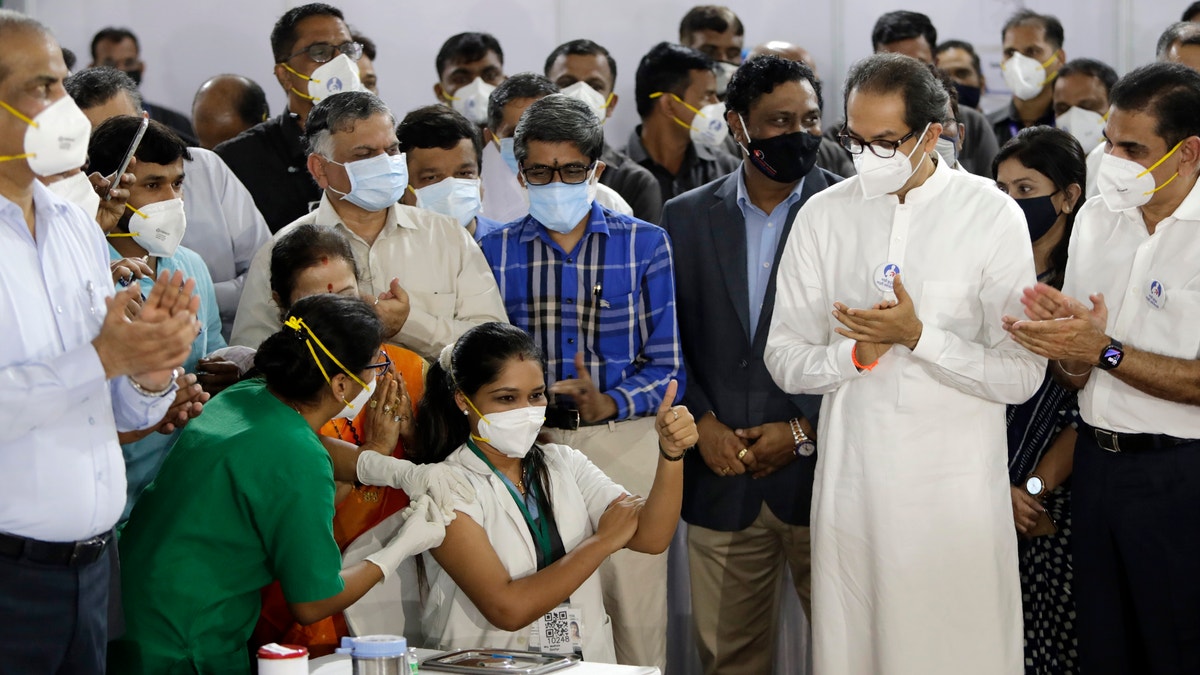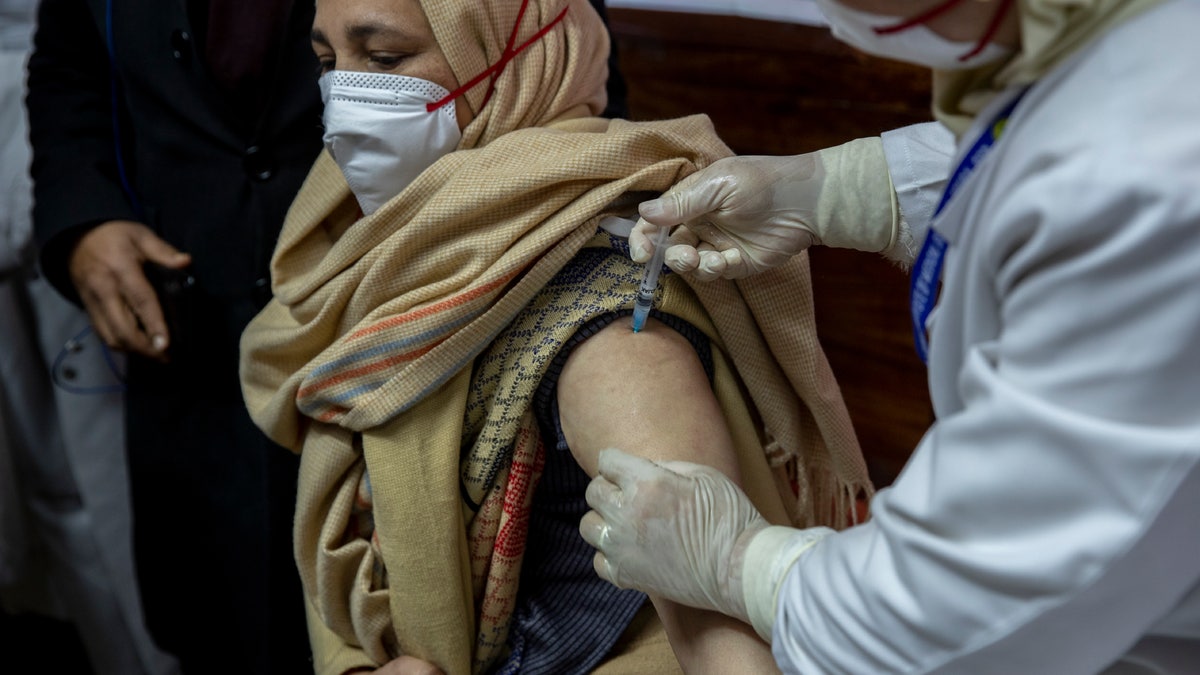New coronavirus variant could fuel spike in cases across US
FOX News correspondent Jonathan Serrie has the latest from Atlanta on 'Special Report'
India started inoculating health workers Saturday in what is likely the world's largest COVID-19 vaccination campaign, joining the ranks of wealthier nations where the effort is already well underway.
India is home to the world’s largest vaccine makers and has one of the biggest immunization programs. But there is no playbook for the enormity of the current challenge.
Indian authorities are planning an initial round of 300 million vaccinations -- roughly the population of the U.S. The recipients will include 30 million doctors, nurses and other front-line workers, to be followed by 270 million people who are either over 50 years old or have underlying medical conditions.

Madhura Patil, a health worker, gestures as she receives COVID-19 vaccine in the presence of Uddhav Thackeray, standing in white dress, Chief Minister of Maharashtra State in Mumbai, India, Saturday, Jan. 16, 2021. India started inoculating health workers Saturday in what is likely the world's largest COVID-19 vaccination campaign, joining the ranks of wealthier nations where the effort is already well underway. (AP Photo/Rajanish Kakade)
For health workers who have helped the nation weather the deadly scourge, the shots offered hope that life can soon start returning to normal.
"I am excited that I am among the first to get the vaccine," Gita Devi, a nurse, said as she lifted her left sleeve to receive the shot.
STATE DEPARTMENT SAYS WUHAN LAB RESEARCHERS MAY HAVE HAD COVID IN THE FALL OF 2019
"I am happy to get an India-made vaccine and that we do not have to depend on others for it," said Devi, who has treated patients in a hospital in Lucknow, the capital of Uttar Pradesh state in India's heartland.
The first dose was administered to a sanitation worker at the All Indian Institute of Medical Sciences in New Delhi, after Prime Minister Narendra Modi kickstarted the campaign with a nationally televised speech.

A Kashmiri doctor receives a COVID-19 vaccine at a government Hospital in Srinagar, Indian controlled Kashmir, Saturday, Jan. 16, 2021. India started inoculating health workers Saturday in what is likely the world's largest COVID-19 vaccination campaign, joining the ranks of wealthier nations where the effort is already well underway. (AP Photo/ Dar Yasin)
"We are launching the world’s biggest vaccination drive and it shows the world our capability," Modi said. He implored citizens not to believe "rumors" questioning the safety of the vaccines.
It was not clear whether Modi, 70, had been given the vaccine. His government has said politicians will not be considered priority groups in the first phase of the rollout.
EUROPE'S CORONAVIRUS CURFEWS AND LOCKDOWNS AT A GLANCE
Health officials haven’t specified what percentage of India's nearly 1.4 billion people will be targeted by the campaign. But experts say it will almost certainly be the largest COVID vaccination drive in the world.
The sheer scale, however, has its obstacles. For instance, India plans to rely heavily on a digital platform to track the shipment and delivery of vaccines. But public health experts point out that the internet remains patchy in large parts of the country and non-existent in some remote areas.

A hospital staff receives a COVID-19 vaccine at a government Hospital in Srinagar, Indian controlled Kashmir, Saturday, Jan. 16, 2021. India started inoculating health workers Saturday in what is likely the world's largest COVID-19 vaccination campaign, joining the ranks of wealthier nations where the effort is already well underway. (AP Photo/ Dar Yasin)
Around 100 people were to be vaccinated in each of the 3,006 centers across the country on the first day, the Health Ministry said.
News cameras captured the injections across hundreds of hospitals, underscoring the pent-up hopes that vaccination was the first step in getting past the pandemic that has devastated the lives of so many Indians and bruised the country's economy.
BIDEN UNVEILS 'BOLD' VACCINATION PLAN TO FIX TRUMP'S 'DISMAL FAILURE'
India on Jan. 4 approved emergency use of two vaccines, one developed by Oxford University and U.K.-based drugmaker AstraZeneca, and another by Indian company Bharat Biotech. Cargo planes flew 16.5 million shots to different Indian cities last week.
But doubts over the effectiveness of the homegrown vaccine is creating hurdles for the ambitious plan.

Hospital staff goes through the documents prior to COVID-19 vaccination drive at a hospital in Kolkata, India, Saturday, Jan. 16, 2021. India started inoculating health workers Saturday in what is likely the world's largest COVID-19 vaccination campaign, joining the ranks of wealthier nations where the effort is already well underway. (AP Photo/Bikas Das)
Health experts worry that the regulatory shortcut taken to approve the Bharat Biotech vaccine without waiting for concrete data that would show its efficacy in preventing illness from the coronavirus could amplify vaccine hesitancy. At least one state health minister has opposed its use.
In New Delhi, doctors at Ram Manohar Lohia Hospital, one of the largest in the city, demanded they be administered the AstraZeneca vaccine instead of the one developed by Bharat Biotech. A doctors union at the hospital said many of its members were a "bit apprehensive about the lack of complete trial" for the homegrown vaccine.
"Right now, we don’t have the option to choose between the vaccines," said Dr. Nirmalaya Mohapatra, vice president of the hospital’s Resident Doctors Association.
India’s Health Ministry has bristled at the criticism and says both vaccines are safe.

Hospital staff gathers around a health worker, sitting, after she received a COVID-19 vaccine at a government Hospital in Hyderabad, India, Saturday, Jan. 16, 2021. India started inoculating health workers Saturday in what is likely the world's largest COVID-19 vaccination campaign, joining the ranks of wealthier nations where the effort is already well underway. (AP Photo/Mahesh Kumar A.)
According to Dr. S.P. Kalantri, the director of a rural hospital in Maharashtra, India’s worst-hit state, such an approach was worrying. He said regulatory approval was hasty.
"In a hurry to be populist, the government (is) making decisions that might not be in the best interest of the common man," Kalantri said.
Against the backdrop of the rising global COVID-19 death toll — it topped 2 million on Friday — the clock is ticking to vaccinate as many people as possible.
In wealthy countries including the United States, Britain, Israel, Canada and Germany, millions of citizens have already been given some measure of protection with at least one dose of vaccines developed with revolutionary speed and quickly authorized for use.
‘TOURISTS' ARE FLYING TO FLORIDA TO SCORE COVID-19 VACCINE EARLY
But elsewhere, immunization drives have barely gotten off the ground. Many experts are predicting another year of loss and hardship in places like Iran, India, Mexico and Brazil, which together account for about a quarter of the world’s COVID-19 deaths.
India is second to the U.S. with 10.5 million confirmed cases, and ranks third in the number of deaths, behind the U.S. and Brazil, with 152,000.
Over 35 million doses of various COVID-19 vaccines have been administered around the world, according to Oxford University.
While the majority of available vaccine doses have been snapped up by wealthy countries, COVAX, a U.N.-backed project to supply shots to developing parts of the world, has found itself short of vaccines, money and logistical help.
CLICK HERE TO GET THE FOX NEWS APP
As a result, the World Health Organization’s chief scientist, Dr. Soumya Swaminathan, warned this week that it is highly unlikely that herd immunity — which would require at least 70% of the globe to be vaccinated — will be achieved this year.
"Even if it happens in a couple of pockets, in a few countries, it’s not going to protect people across the world," she said.









































